Yes we are.
We’re having more extreme events, more often, and in locations that are unusual to have those sort of events, and at new times for them to occur. You likely have experienced one or more events in recent years and possibly even at the same time.
The United Nations Office for Risk Reduction’s “The Human Cost of Disasters: an Overview of the Last 20 Years (2000-2019)” provides these statistics: from 1980-1999 there were 3,656 climate-related disasters and extreme weather events and from 2000-2019 there were 6.681.
“The last twenty years have seen the number of major floods more than double, from 1,389 to 3,254, while the incidence of storms grew from 1,457 to 2,034. Floods and storms were the most prevalent events.”
They also report “major increases in other categories including drought, wildfires, and extreme temperature events.”
Extreme weather events are becoming more frequent and severe
Weather extremes are showing up in many forms: tropical cyclones, heavy precipitation, floods, high-tide floods, marine heat waves, droughts, wildfires, and heat extremes. Wherever you live you may experience one or more of these.
Where I live, we have certainly had heat extremes, drought, wildfires, some heavy precipitation, and even extreme snow events (more on that below). Read all about each of these at NASA’s Extreme Weather and Climate Change page.(2).
The one you may not have experienced is marine heat waves. As temperatures rise in the atmosphere, the oceans absorb a lot of the heat. These heat events harm corals and other marine life because they’re not adapted to the warm temperatures. And they influence our weather.
There have always been extreme weather events. Scientists use historical data to determine what’s normal for an area and what’s normal for frequency and severity. They also use climate models with land and sea data and observations to see if events are changing and how they might in the future if global warming continues.
The Intergovernmental Panel on Climate Change (IPCC), the UN’s body for assessing the science related to climate change warns that climate change will result in more severe weather extremes, increased frequency, and in new locations.
Is it from climate change? And how?
The year 2023 was officially recorded as the hottest year on record.
This was reported by Europe’s Copernicus Climate Change Service. They report that the planet’s average temperature reached 1.48°C. Our cap for CO2 emissions from the 2015 Paris Climate Treaty is 1.5 degrees. The previous hottest year record was in 2016.
According to the Copernicus Climate Service’s director, Carlo Buontempo, “evidence suggests the world hasn’t been this warm in 100,000 yrs.” according to an interview with him in the Business Insider’s Sustainability Newsletter.
Why? Because since the late 1800’s when coal was discovered as a fuel source and started being used, the results of burning this and all the other fossil fuels since, are largely carbon dioxide and water.
Carbon dioxide (CO2) is the gas in the atmosphere that’s responsible for making life on this planet possible. Just a little bit, 0.04%, is what keeps the blanket of atmosphere from freezing the entire planet and from letting it bake in the sun. That little bit is important!
Carbon dioxide traps the sun’s energy and converts it to heat energy. Like a greenhouse. Like when you sit in a car with the windows closed in the sun. You know what happens. It gets hot.
For the entire period humans have been on the planet, about 190,000 yrs., there’s been just the right amount of CO2 to keep temperatures just right for us humans and all the plants and animals that we have depended on for food, shelter, clothing, and fire.
Now, there’s a lot more CO2 so there’s more heat energy getting trapped in the atmosphere. And the atmosphere is what makes our weather.

Scientists agree that these weather crises are increasing in frequency and severity because of the increasing heat in the earth’s atmosphere from CO2.
Let’s take a quick look at how this happens.
How heat affects the weather
The seasonal changes from revolving around the sun plus the earth’s daily rotations developed the stable air currents and ocean currents we’ve always known.
These currents have created reliable climate and weather patterns. They developed on a planet that’s had a consistent concentration of CO2 in its atmosphere making the patterns stable for eons. Except for a few aberrations with ice ages (from earth tilt wobbles) and volcanic activity.
Warmer air and ocean temperatures change the normal circulation of air masses, and that affects the normal ocean water currents. They also evaporate more water from the land and put it into the atmosphere.
These changes in heat and current flows change normal weather patterns.
More moisture in the atmosphere makes bigger rainfall events more likely. And more heat makes dry areas drier. Plus, the biology that evolved with the stable weather and climate patterns will not fare so well with different patterns.
Sign up for my newsletter and get my latest posts and more good tips to help this beautiful blue planet!
Why are we getting extreme cold events when the planet is warming?
The climate and weather patterns are changing, and the warming of the atmosphere is not even all around the world. Jet streams are changing and sometimes the Arctic jet stream gets pulled farther down south than usual. And when an Arctic air mass meets a moisture-rich mass it can dump a lot of snow.
Why it seems to be creeping up slowly
In my high school chemistry class we did an experiment I never forgot. Maybe you’ve done it, too.
We took a beaker of ice water and measured the temperature of the water. We put a Bunsen burner under the beaker and proceeded to heat the water. Every few minutes we measured the water temperature as it warmed. We were to measure it till it boiled and a little beyond.
The temperature rose slowly until the ice was melted. Then it rose fast to boiling. We graphed the temperature vs. time and it was very clear that once the ice was gone the temperature rose much faster.
I think you can see the point of this.
Is it too late?
It’s late in the game,. We’ve known about the problem for decades, since the 1950s. (The fossil fuel companies knew back then, too, by the way.)
But I strongly feel that we must do everything possible to turn the trajectory around. It likely means we’ll go through an extremely difficult period. For a long time. But I feel that each one of us can give of ourselves now to start to turn this around and to offer hope for a good future eventually.
We can each give to the children of the earth, now and in future generations, so they can enjoy the stable beautiful earth we have known. And for all the planet’s inhabitants.
Be a voice for climate action—make your voice heard: join groups, write to your representatives, vote for climate action, be informed, join protests.
Adopt an eco-friendly lifestyle: consume less, practice ecological landscaping and gardening (soil has great potential to help), drive less, strive to use less gas, wean yourself off of perfect comfort in your home (try to go without air conditioning, I do), plant trees, eat locally grown food, choose organically produced food… and so on.
Read and see helpful resources: See the Common Ground Film (2023) , Kiss the Ground (2020 film on Netflix), read Kiss the Ground* the book, There is No Planet B*…
With every child you see think about how you can help assure them the best future planet you can. Like the one we’ve all enjoyed so far.
Related Reading
Just What is Carbon Dioxide and How Does it Cause Climate Change?
Two Powerful Ways Soil Soaks Up Carbon Dioxide
Ocean Acidification—What It Is, What’s Causing It, and What Can We Do?
* Beautiful Blue Planet is a participant in the Amazon Services LLC Associates Program, an affiliate advertising program designed to provide a means for sites to earn advertising fees by advertising and linking to Amazon.com. When you buy via the links on this site, I may earn an affiliate commission at no cost to you.

